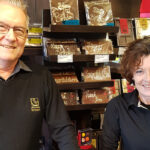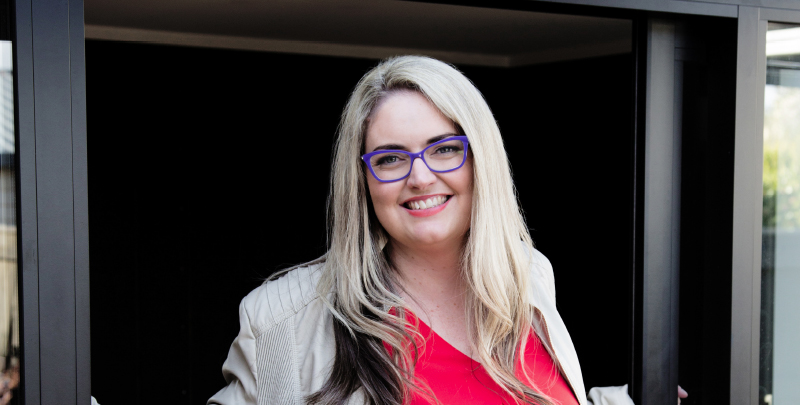Confessions of a Coaster
The South Island’s West Coast is known for its hardy, pioneering spirit. Now its most famous…
The South Island’s West Coast is known for its hardy, pioneering spirit. Now its most famous entrepreneurial daughter, Dame Julie Christie, hopes to draw on her considerable business development know-how to help grow the region’s economy.
Glenn Baker covers the life and times of a remarkable self-made business woman.
hey breed ‘em tough on the West Coast. It’s where survival requires resilience and determination.
The Coast is a demanding, yet spectacular environment – squeezed between the tempestuous Tasman Sea and soaring Southern Alps – where long-standing industries such as gold and coal, dairy and tourism, have been battered not just by global economic vagaries, but by the challenging climate.
Dame Julie Christie’s roots are deeply embedded here. Growing up in Greymouth, with six siblings, life was pretty full-on. She was just five and all seven children under 12 when her father passed away.
Today, with a holiday home at beautiful Lake Kaniere, the 56-year-old mother of two is still a local ratepayer. She remains connected to family on the Coast and cares deeply about the region’s prosperity.
One can only respect and admire the business career Christie carved out over more than three-and-a-half decades. She is the epitome of a self-made woman.
It began innocently enough when she graduated from Wellington Polytechnic in 1979 with a Diploma in Journalism – a course she chose because “it only involved one year of poverty”.
Since then, Christie’s CV documents a remarkably busy life as a professional director and entrepreneur, an award-winning television producer and director, and recipient of the DNZM (Dame Companion of the New Zealand Order of Merit) for services to governance and television – granted in this year’s Queens Birthday honours list, to follow her ONZM for services to film and television awarded in 2008.
The DNZM honour attracted its critics. There are some who argue that reality television was the reason for the reduction of quality drama and current affairs on local screens. But as Christie stated in a 2006 NZ Listener article, her goal was
to be a major commercial success; it didn’t have to be a “critical success”.
The critics missed the point of the recognition, she explains to NZBusiness. Aside from her enormous contribution through Government governance roles, over the years she has employed, mentored and encouraged hundreds of people – many of whom have reached the top of their field.
Her successful ‘unscripted’ television shows helped finance four New Zealand feature films that may not have otherwise been possible, and the DNZM is also recognition of her having started the export culture within television.
In many respects Christie was once a lone player in the hard, ratings-driven school of television, with all the responsibility of running a multimillion-dollar business.

She still regards her triumph over adversity as a legacy of her mother, “who had a tremendous work ethic”, and of her West Coast upbringing.
“In terms of succeeding at what I did, I never thought for one minute that I couldn’t,” she says.
But there were tough lessons along the way.
Christie made good money in the early days through sheer volume of television production, but because the networks insisted on owning the IP, control was lost.
That changed in the mid-90s when she fought to control her own IP. “Actually you don’t have to own the IP, you just have to control the royalties from it,” she explains.
“That was how I created a different type of TV business. When the time came to sell I had built up real value.
“That knowledge of IP and how to exploit it, set me up for everything I’ve done since, and helps with my board work.”
Success is a word that characterises Christie’s life perfectly; a word that drove her from one project or directorship to another, along with a deep passion for New Zealand.
She describes herself as a “hand on heart patriot”, which is why she accepted the appointment for the New Zealand Flag Consideration Panel. “I just wanted us to come out from under the shadow of Australia. To me it was our time. I’m a big believer that it’s New Zealand’s time to shine [on the world stage].”
When choosing governance roles, Christie selects only those she believes she can make a real contribution and difference to. Currently, in addition to her trustee role at Development West Coast (DWC), she serves on the steering group for New Zealand’s multi-million dollar participation at Dubai’s World Expo 2020; on the commercial committee of the Board of New Zealand Rugby; and on the New Zealand Story board – ‘a government initiative to help Kiwi businesses and government agencies communicate New Zealand’s unique value to the world’.
It’s that economic development experience – honed over years marketing her reality TV shows to buyers worldwide and the six years on the Board of New Zealand Trade and Enterprise – that she especially wants to apply to her role at DWC.
Vision spelt with a ‘tele’
Julie Christie admits, somewhat surprisingly, that generating ideas wasn’t always her forté – especially during her early career.
“I wasn’t a particularly ambitious or exceptional child,” Christie recalls. “I certainly didn’t think long-term, and still don’t.
“I never had a five year plan, because I don’t believe you ever fulfil them.”
The ideal business plan should only take up a single page, she adds. “It could actually be expressed in one phrase.”
SWOT analyses and business plans generate only a mindless following of templates, she suggests.
“The key [to business success] is focus, focus, focus – on your core customers and core business. If you’re looking to broaden your business, ask yourself – is it really what the market’s telling you?”
For Christie, the word ‘vision’ has long been prefixed by the word ‘tele’.
Her television odyssey began when redundancy from the Auckland Sun newspaper in 1988 led to a research job in television. That’s when the light-bulbs all came on and she realised the massive pulling power of television.
Having always been an avid TV fan, turns out she knew exactly what people wanted to watch. She exercised that talent through a seemingly endless stream of mostly formatted, entertainment shows produced by her company Touchdown Productions (formed in 1991 and sold in 2007 to Dutch company Eyeworks). Her last show, The Block New Zealand, was first produced six years ago but is this year achieving better ratings than ever.
All those years running a television production company and negotiating with the networks delivered plenty of painful lessons for Christie.
“The stand-out was when a new TVNZ [programming executive] decided to take all my shows off me and produce them in-house,” recalls Christie. “It nearly broke my company and the lesson was, I didn’t own the IP so I could not fight it.
“But I’m proud to say now that none of those programmes lasted a year! That’s when I decided I was never going to sign another contract without control of the IP.
“That failure was the absolute turning point in my career.”
Six months later she went on to produce Police Stop!, hosted by Peter Brock – the very first number one series for TV3 – which was doubly satisfying.
In 2017, Christie says the same battle is happening again, with networks wanting to own the re-broadcasting rights of popular shows. “The fight is on again, because never has television been so saleable all around the world.”
Other vital lessons from her Touchdown days include never hanging your business on just one large customer.
“The best thing I ever did was decide to make television in New Zealand, not New Zealand television. I developed a global business. Today, that’s the best way to approach business from day-one. With today’s connectivity it’s
a lot easier.
“There’s also no such thing as luck in business – it’s all about good timing and good management,” Christie says.
And it’s about good financial management too. “I had my brothers as my accountants from my earliest days in business. I’m also debt averse, which helps.”
Christie was prepared to work up to 18-hour days, taking on the role of writer, producer and director – billing for all three. “That’s how I made money. In hindsight it was a bit naughty, but I earned it.”
She remembers her most lucrative programme, heart monitor gameshow The Chair, which sold to 29 countries – most recently to South Korea. “That’s when you realise that a good idea is not just a good idea – it’s about how you execute it; perfecting the execution.
“That applies to anything. Then if things fail, they’re more likely to fail due to the execution, not the idea.”
Christie has advice for start-ups that want to thrive too – the most important tip being “be first” [to market]. “If you’re going to be second – just don’t copy. Work on a better execution.
“And be really aware of [what trends are going on in] the world, not just your own backyard.
“I was first to license formats out of Europe. I realised that if I was licensing formats from other producers, then people would license formats from me. That’s how my international business started.”
Her pick for the big trend in television for 2017 and beyond? 24-hour news; “news that captures people emotionally”. And documentaries. You read it here first.
Learning about governance
Dame Julie admits she’s “softened with age”, and with her TV production days well behind her, has finally managed to stop sweating the small stuff.
She’s loving her governance roles, which keep her busy and satisfy her passion to advance New Zealand on the wider global stage.
There were some harsh realities that came with sitting on boards, she confesses – not least of which, the need to “know very well what you don’t know”.
Boards are not glamorous and don’t particularly pay very well, she adds. “And they are all about the chair and the CEO, in that you can’t make much progress without a high-calibre chairman and chief executive.
“Boards also work best when around 80% of their time is focused on strategic issues, and the rest on operational issues.”
A hands-on entrepreneur at heart, Christie was understandably keen to be a ‘doer’ when it came to board participation. Letting others do stuff and getting on with the ‘thinking’ has been challenging for her. But she’s thoroughly enjoying the whole experience.
“Boards change companies, and you get to work with a bunch of great people. People like NZTE’s Peter Chrisp, who’s the best CEO I’ve ever worked with. He has completely changed that government agency. Over the six years I spent on the NZTE board I learnt a lot about culture change. Compared to the private sector, government boards operate in a much more formal, structured and clearly understood manner. And that’s been great learning for me.”
On damehood and dubai
Receiving her DNZM has definitely helped motivate Christie to make a difference going forward.
She believes the honour respects the fact that she’s willing to take on the tough jobs. Having divested herself of her companies she’s now in a much better position to take up that responsibility.
Christie says she’s a big believer in measurable outcomes – and with World Expo 2020, that’s exactly the goal. The focus is all about encouraging investment and trade, and attracting more customers for New Zealand products outside of Asia.
Diversification [of markets] is vital future-proofing, says Christie. It’s a bit like only having one large customer when you’re in business. If a crash occurs is one region of the world, the overall impact will be minimised.
“Dubai is our chance to show the world what an innovative, forward-thinking country New Zealand really is.”
She agrees with Simon Annault, a worldwide country-brand expert, who says New Zealand should portray itself as the ‘goodest country in the world’ – “because everything about us is good for the world and people want to do business with good people”.
New Zealand rates so highly on so many fronts, and that’s important to our future, Christie believes.
Back to her roots
As for her own immediate future, Christie is looking forward to helping address some of the challenges the West Coast faces. It is early days. At the time of writing she had only attended one monthly DWC meeting, and admits she still has a lot to learn.
“I was appointed by the three mayors on the Coast and the chair of the Regional Council, so it’s a tough call. But I really want to make a difference.”
She believes the region is slowly shaking off its reputation as a backwater only for the tough and the hardiest. Nowadays a much larger percentage of the population originates from outside the region and it’s those people who are perhaps more open to new ideas.
However she points out that 89% of the land on the West Coast is conservation land.
“From a commercial perspective that’s incredibly limiting. My question is: What’s genuine conservation land? There has to be a lot of waste in there.”
Tourism’s not the single answer either, she believes, and she’s keen to apply her export and business knowledge to help DWC invest more in opportunities within the community.
There are opportunities within the Coast’s natural resources – such as carbon-based products (other than raw coal), and renewable resources, such as water – as well as generating more revenue from people who utilise the facilities on walking trails and at DoC-controlled tourist attractions.
For now Christie is looking forward to the positive outcomes that will come from her time with DWC – as well as her work with World Expo 2020 and her ongoing association with New Zealand Rugby.
And although this Coaster’s keeping her cards close to her chest on the subject, there might even be time in the not-too-distant future to produce a documentary series for the international market.
Of course it’s not in any five-year plan – she doesn’t believe in those.
But Dame Julie Christie does believe in achieving what you set out to do.
That’s the story of her life.



